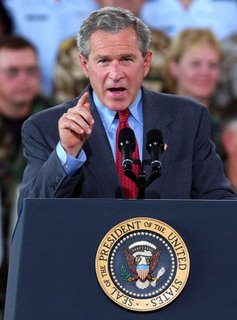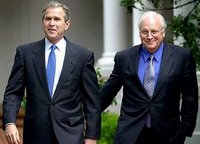State of the Nation
This is a rather long post, but I promise it'll be the only one all day. This is something I've been thinking about for a while now, but I've only just decided to put it into words.
The past 6 years have seen a huge shift in the values of America as a nation, in the things it stands for and the actions it takes. In large part this can be traced back to the events of 9/11, and in light of that, much of the fear and confusion since can be understood. I am talking about the actions this country has taken, specifically that the executive branch has taken, that I feel is at odds with the principles that America stands for. Although 9/11 can explain the environment which allowed these to occur, I don't believe that justifies it. Furthermore, I believe that the post-Bush era, i.e. after 2008, is fundamentally crucial to determining the state of America this century, and the future role that this country will have, say, 50 years from now. Let me explain.
The changes that I'm talking about are new policies such as the use of torture as a form of interrogation, various encroachments on civil liberties, extralegal steps taken by this administration to skirt oversight (such as signing statements), the perversion of science to fit the politics, etc.
 If these policies, and those are only a few, become associated with Bush and his 8 years of rule, then they will be but a blip in history, an unfortunate deviation from an otherwise honorable ascent towards an ever-expanding concept of freedom. As this administration's ship goes down, it will take with it the policies that they've created. It will be viewed historically not as indicitave of the values America stands for, but rather as an unfortunate deviation in history, such as the Red Scare in the 50's.
If these policies, and those are only a few, become associated with Bush and his 8 years of rule, then they will be but a blip in history, an unfortunate deviation from an otherwise honorable ascent towards an ever-expanding concept of freedom. As this administration's ship goes down, it will take with it the policies that they've created. It will be viewed historically not as indicitave of the values America stands for, but rather as an unfortunate deviation in history, such as the Red Scare in the 50's.In fact, I see many parallels between the McCarthy era and today. Both came at the beginnings of generation-long conflicts, when the country was unsure about how to face the new menace, and both were reactions based in fear and stinking of political opportunism. Both played up the importance of loyalty and blind patriotism.
 One came to its logical conclusion with the disgrace of McCarthy; I hope the other does the same, and the sooner the better.
One came to its logical conclusion with the disgrace of McCarthy; I hope the other does the same, and the sooner the better.If, on the other hand, the next president in 2008 continues those said policies above, the policies themselves will fail to be associated with any one president and any one era, and will instead become the default for how people view America. The secret prisons, the rampaging executive power, the lack of oversight and proliferation of secrecy; if these things don't wash out with the tide of the Bush presidency, they will linger on and on. They will become a part of our national consciousness, and will be absorbed into our own image of what America is and what America stands for.
And that cannot last. The war on terror is not something that can be won by military might alone. It is something that must be fought psychologically as well as militarily, and in order to win we must take the morally higher ground and hold it. We cannot occupy other countries in the name of human rights, if we do not recognize those human rights ourselves.
Power never gives itself up.
 A future president, inheriting greatly expanded powers of the presidency, will never voluntarily give the Congress or the Courts back the powers that previous executives have grabbed. That president will use those powers in the name of whatever conflict is most crucial at the time, and perhaps he or she will be just in applying those powers, and successful in facing the conflict at hand.
A future president, inheriting greatly expanded powers of the presidency, will never voluntarily give the Congress or the Courts back the powers that previous executives have grabbed. That president will use those powers in the name of whatever conflict is most crucial at the time, and perhaps he or she will be just in applying those powers, and successful in facing the conflict at hand. However, the founders separated powers for good reason; if it is unfortunate that a successful, honest leader does not have ultimate power to wrestle this country in the right direction, we have far more to lose if a terrible president were to take that same, unrestrained power. Obviously, the only way to prevent this is to separate power equally, among the Congress and the Court. But these institutions, too, have been as bad or worse than the Executive at defending America's values.
You have a Court that now has at least four members who completely or partially subscribe to the theory of an immensely powerful executive, and as I posted below, with the addition of Kennedy siding, they have a sometimes-majority; put one more pro-Executive Justice on the bench, and you've got a permanent majority for a very long time.
 You have a Congress that has written a blank check for this administration and to date has performed no oversight whatsoever of the extracurricular policies this Executive has undertaken. It is one of the most corrupt and partisan Congresses in history, and has written a blank check to this administration in return for money and a guarantee on incumbency. For the 2000 congressional election, the rate that incumbents were elected was 98% - 98%! I don't know anyone who would say they're happy with 98% of their Congress.
You have a Congress that has written a blank check for this administration and to date has performed no oversight whatsoever of the extracurricular policies this Executive has undertaken. It is one of the most corrupt and partisan Congresses in history, and has written a blank check to this administration in return for money and a guarantee on incumbency. For the 2000 congressional election, the rate that incumbents were elected was 98% - 98%! I don't know anyone who would say they're happy with 98% of their Congress.The only barrier to the continued expansion of presidential powers is the people at this point, and in this is vested the last barrier to tyranny. But here's the thing - we can vote the bastards out.
This administration has done damage to America's name is countless ways, and it will take at least a generation to heal those wounds. These are not bleeding heart concerns; we cannot win against an enemy that by definition has no home, has no base, and is propelled forward by an concept. The only way we can beat it is by winning the struggle of ideas, and I fear we have done shamefully little to make our case in the Muslim world.
This is not the America I know. This is not the America my parents came to, nor is it the America I want my children to come in to. The America I know stands up for human rights, no matter what the citizenship. It recognizes that every human is afforded some measure of basic dignity, no matter how vile that human might be. It recognizes that torture is illegal, something that Bush has failed to do -in fact, actively fought against (see signing statement to McCain bill).
 During the Cold War, we could measure ourselves against an enemy that was expanding and spreading its influence across the world. We could always look at the USSR and say, wow, well at least we're not torturing people. Well, throw that one out, because now we are.
During the Cold War, we could measure ourselves against an enemy that was expanding and spreading its influence across the world. We could always look at the USSR and say, wow, well at least we're not torturing people. Well, throw that one out, because now we are.In a sad sort of way, I'm glad this is happening now, and not in 20 years. If this kind of detour had to happen, it's better that it happened at the beginning of this conflict. This will be one of the major struggles of our time. One thing I've learned in my relatively few years is that the harder you have to struggle, the better you'll come out on the other side. A species that is forced to live in the desert will make due with little water. A country that goes through a political train wreck will, hopefully, never suffer the same fate for a generation.
Having dealt with the past 6 years, and, gosh golly, another 2, I hope will permanently affect our generation. Turnout last election among young people was higher then it has been before, although, unfortunately not high enough. I hope that if and when our generation becomes politically dominant, we take the lessons learned from this era to heart. I hope that when we are in charge, we demand that our leaders are intelligent, competent, and honorable. I hope that we ask, during the campaign, what are your ideas for this country, not who is the more manly of the two.
The stakes are not low in this. I think our generation faces some of the largest and most
 consequential struggles in the history of this country. I identify four major struggles; there may be more, but I think these are the most important. In addition, all these struggles are related, and one will benefit from the success of another.
consequential struggles in the history of this country. I identify four major struggles; there may be more, but I think these are the most important. In addition, all these struggles are related, and one will benefit from the success of another.1. Dealing with the rise of China, India, and others as equal competitors on the world stage. To a broad extent this has already begun, but it will continue and accelerate over the coming years. With populations of over 1 billion people each, both China and India have the brainpower, the manpower, and most importantly, the drive to succeed economically on a global scale, and if not challenge America's hegemony, at least nip at her heels. This is a topic admittedly I know little about, but am trying to educate myself on furiously. I'm sure others on this site will be able to pontificate more about this.
2. Fighting terrorism, and militant Islam. What more can be said? This is the cold war of our times. It goes without saying that we must win this, and that we currently are not. This conflict ultimately will not be won through tanks and guns but by a conflict of ideas. Furthermore, our ideas will win because they are better. Dignity and freedom for all will always conquer a narrow world-view that seeks to restrict what people can think and say.
3. Fixing the environment. Hoo baby, we have not begun to scratch this one. We must find ways in the next twenty or thirty years to exist within our environment without pillaging it. With the rise of other very large and industrial countries, we must first lead by example, or we will be permanently destroying this beautiful planet. A great first step would be to concentrate on energy, specifically green technologies or renewable sources. A decreasing reliance on oil would not only be beneficial to the environment, but would be geopolitically helpful as well.
 4. Dealing with, and integrating, civil rights in an increasingly digital framework. There are two things here, and I think this has gotten extremely little press, and the only defender so far has been the EFF. Computers and the internet have been compared, in their effect on society, as equivalent to electricity; I would go even farther and say that, in their effect on the human race in the next hundreds of years, it will be more akin to the discovery of fire. The existence of a national network connecting all humans everywhere, with an architecture that represents all media, or anything that can be represented visually, aurally, or even tactilely, in the same basic format of 1's and 0's will have an enormous effect. However, the internet that we're used to, wide open, sprawling, largely free of regulation, democratic, is not guaranteed. That is, there is nothing inherent in the internet that guarantees its democratic and level nature. If we want it to stay free and open, we must fight for that right - that's the first issue. The second issue is guaranteeing our civil liberties in a world where technology is inevitably ubiquitous. It's that old line, guns don't kill people - people kill people. The technology is not inherently evil, but when you pair satellites that can read the words on a newspaper, cameras, facial recognition software, hard drives to store this immense data, and a potentially future paranoid government with no respect for civil liberties, the capability for a police state are much higher then they've ever been before. The only way to prevent this is to fight it legally; we have a wonderful country that in its ideal would preserve these rights over all platforms, including the internet, but we must fight to maintain those rights.
4. Dealing with, and integrating, civil rights in an increasingly digital framework. There are two things here, and I think this has gotten extremely little press, and the only defender so far has been the EFF. Computers and the internet have been compared, in their effect on society, as equivalent to electricity; I would go even farther and say that, in their effect on the human race in the next hundreds of years, it will be more akin to the discovery of fire. The existence of a national network connecting all humans everywhere, with an architecture that represents all media, or anything that can be represented visually, aurally, or even tactilely, in the same basic format of 1's and 0's will have an enormous effect. However, the internet that we're used to, wide open, sprawling, largely free of regulation, democratic, is not guaranteed. That is, there is nothing inherent in the internet that guarantees its democratic and level nature. If we want it to stay free and open, we must fight for that right - that's the first issue. The second issue is guaranteeing our civil liberties in a world where technology is inevitably ubiquitous. It's that old line, guns don't kill people - people kill people. The technology is not inherently evil, but when you pair satellites that can read the words on a newspaper, cameras, facial recognition software, hard drives to store this immense data, and a potentially future paranoid government with no respect for civil liberties, the capability for a police state are much higher then they've ever been before. The only way to prevent this is to fight it legally; we have a wonderful country that in its ideal would preserve these rights over all platforms, including the internet, but we must fight to maintain those rights. All of these problems can be dealt with, if there are leaders who are willing to tackle them and a public willing to support them. I believe the latter is true today; the public overwhelmingly prefers a candidate of moderation and competence to the bitter partisanship of the last two elections. We want somebody, and it doesn't matter what party, who can stroll into government and fix things, who we can trust not to abuse their power, and who will fight corruption. We want somebody who can work across party lines to get things done. We want somebody who is doing things because they believe in them, not because they think it will help them in the next election.
All of these problems can be dealt with, if there are leaders who are willing to tackle them and a public willing to support them. I believe the latter is true today; the public overwhelmingly prefers a candidate of moderation and competence to the bitter partisanship of the last two elections. We want somebody, and it doesn't matter what party, who can stroll into government and fix things, who we can trust not to abuse their power, and who will fight corruption. We want somebody who can work across party lines to get things done. We want somebody who is doing things because they believe in them, not because they think it will help them in the next election.In short, we need leaders like we had of past conflicts, leaders who led us through calamitous times and got us through in one piece. Who are those leaders today? Who will stand up and save America from what she is becoming?

1 Comments:
Boring...
No man, great post. I agree that we as a nation need to tie this political movement to the man who deserves it, and not to the country that is still reeling from its effects.
Post a Comment
<< Home